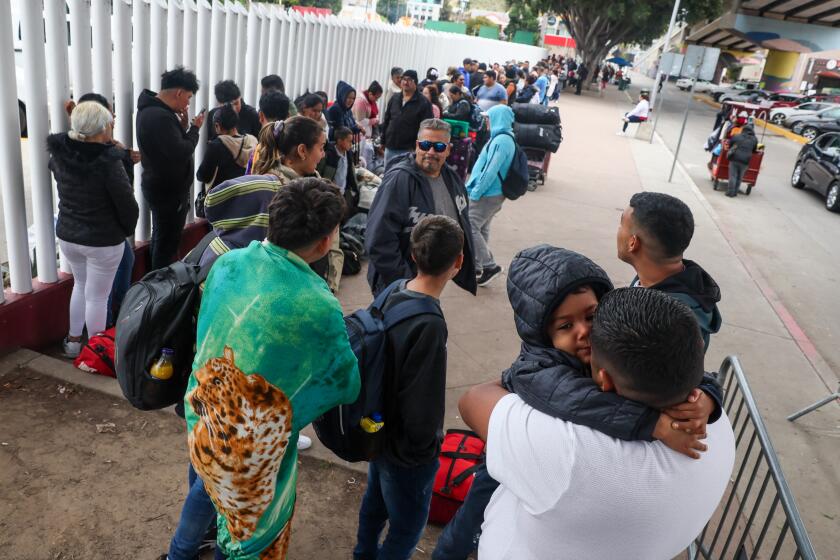Survivors, Others Take Offense at Word ‘Refugees’
In Houston, where tens of thousands of Hurricane Katrina victims have sought temporary shelter, officials distributed a terse memo Wednesday dealing not with food, lodging or human connections, but with something that in its own way has become just as emotionally loaded: the word “refugee.”
“The term is perceived negatively by many of those housed at the Astrodome, who prefer to be called evacuees,” said the memo to reporters, which addressed a heated conversation that has echoed in recent days from emergency shelters through the media to the White House.
“I’m not a refugee; I’m an American,” said Daphne Carr, 37, who fled New Orleans with her niece, Loasha, 9, and is staying at the Astrodome.
The discussion might seem a mere exercise in semantics in a time of catastrophe, but language observers say it underscores the fact that seemingly benign words can take on powerfully negative connotations, depending on the circumstance.
“Here we are talking about people who have lost their homes and have gone to another state,” said Donna Jo Napoli, a linguistics professor at Swarthmore College. “Although there are ways in which their situation is parallel to a refugee situation, the fact is they are our own people. They are not refugees.”
Webster’s New World Dictionary offers this definition: “A person who flees from home or country to seek refuge elsewhere, as in a time of war or of political or religious persecution.”
Though some might argue that the word is apt, given that definition, black leaders have strongly objected to its use when applied to Katrina survivors, many of whom are black. Bruce S. Gordon, president and chief executive of the National Assn. for the Advancement of Colored People, said the word reduced the displaced victims “to a level that is below citizenship.”
“These are American citizens, plus they are the sons and daughters of slaves,” said Rep. Diane Watson (D-Los Angeles). “Calling them refugees coming from a foreign country does not apply to their status. This shows disdain for them. I’m almost calling this a hate crime.”
This week, President Bush weighed in after meeting with evacuees in shelters near Baton Rouge, La. He made it clear: Hurricane survivors are “not refugees.” “These are Americans, and they need the help and love and compassion of our fellow citizens,” he said.
Not everyone considers the word taboo. Blogger Stephen Baker of BusinessWeek.com asked, “Why run from the word ‘refugee’?
“If [displaced residents] object to it, I’ll avoid it,” he wrote. “But I think part of the problem is that we associate refugees with foreigners in hellish parts of the world. If there’s one good thing to come out of this tragedy, it might be that we start to see that other refugees, whether in Africa, Asia or Latin America, aren’t so different from us.”
Even so, the concerns have prompted many news outlets to reevaluate their use of the word.
The Washington Post stopped using the term over the weekend, saying its use did not “fit the definition.” The Boston Globe also banned it. The Los Angeles Times is taking steps to make sure it is used judiciously. The New York Times and Associated Press said they would use it on a case-by-case basis.
For some reporters, habits are hard to break. In a White House briefing, one reporter struggled to frame a question: “Who’s running the entire refugee -- sorry, the displaced people, or whatever they are now -- there’s no one person in charge of the entire operation now?”
One language observer, Paul J.J. Payack, has been following the issue for a week. A San Diego high-tech executive and president of yourDictionary.com, he also runs the Global Language Monitor (www.languagemonitor.com), which analyzes word usage trends.
Global Language Monitor found that the term “refugee” was usually associated with places like the Sudan and Afghanistan. It has appeared five times more frequently in the global media than the more neutral “evacuees.” Payack said he was struck by the use of the word “refugees” to describe victims of Hurricane Katrina.
Using a proprietary algorithm that analyzes databases that include mainstream media, the Internet and the blogosphere, he determined that as of one week ago, “refugees” was being used five times as often as “evacuees.” By Tuesday night, however, that had changed dramatically.
“It was down to 60-40 ‘refugee’ versus ‘evacuee,’ ” he said.
Payack does not make a judgment about which word is correct. “All we are doing is monitoring what people are saying,” he said. “It was strange, though, watching Wolf Blitzer say ‘evacuee’ over and over. I think we could sit down and come up with a better word. Victims? Displaced persons?”
*
(BEGIN TEXT OF INFOBOX)
What’s in a name
Definition of “refugee” by the Oxford English Dictionary:
1. a. One who, owing to religious persecution or political troubles, seeks refuge in a foreign country; originally applied to the French Huguenots who came to England after the revocation of the Edict of Nantes in 1685.
b. A runaway; a fugitive from justice, etc. (rare)
c. transf. of migratory birds. (obsolete, rare)
d. Someone driven from his home by war or the fear of attack or persecution; a displaced person. (also figurative)
2. A name given, especially in New York state, to parties of marauders in the American Revolutionary War who claimed British protection.
3. a. Used appositively, as refugee family, scholar, tutor, etc.
b. Characteristic of a refugee. Also, of or pertaining to a refugee or refugees, as refugee camp, centre, colony, project, style, train.
*
Staff writers Tony Perry in Houston and Steven Barrie-Anthony in Los Angeles contributed to this report.
More to Read
Start your day right
Sign up for Essential California for news, features and recommendations from the L.A. Times and beyond in your inbox six days a week.
You may occasionally receive promotional content from the Los Angeles Times.







